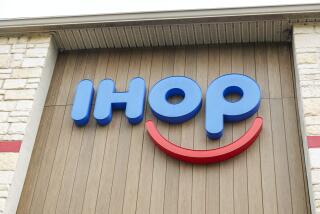Short-Selling of IHOP May Signal Franchising Concern
- Share via
Weeks after IHOP Corp. went public in July, short-sellers began swarming around the Glendale restaurant chain’s stock in hopes that its price would tumble.
Since then, short interest in IHOP has surged to an unusually high 12% of the company’s common stock. That compares with overall short interest of less than 1% of outstanding shares for all stocks listed on the NASDAQ over-the-counter index, on which IHOP is traded.
The anticipated IHOP stock price plunge has yet to happen--the stock was offered at $10 a share, rose above $15 and closed Monday at $13.375.
So why are short-sellers, who sell borrowed stock hoping that its price will fall before they buy it back and return it, so downbeat on the company’s International House of Pancakes chain?
Analysts who follow IHOP say the company has a potential flaw: its reliance on onetime franchise start-up fees. Last year, those fees accounted for 95% of pre-tax earnings, according to IHOP’s calculations.
The president of one investment firm that recently shorted IHOP stock said: “Most net earnings come from onetime new store openings . . . but those earnings may go away if this company doesn’t open more stores.”
IHOP’s chairman and chief executive, Richard K. Herzer, said in an interview that he’s aware of the short interest in IHOP stock but insisted that the franchise concept is profitable, citing steady growth in the number of IHOP franchises over the past few years. Currently, there are 499 IHOP restaurants in 36 states, plus Canada and Japan. Of those, only 56 are company-operated.
Herzer hopes to franchise 25 to 35 new restaurants a year. Herzer said profits from franchised restaurants are typically better than company-owned restaurants because the franchisees have a greater financial stake in the business.
Meanwhile, IHOP’s stock offering raised $27.6 million for the company, which has used most of it to trim IHOP’s debt.
But short-sellers aren’t convinced about IHOP’s future.
They note that IHOP franchises new restaurants in return for start-up fees of between $200,000 and $350,000 each. But franchise owners only have to pay 20% of the fees in cash; the rest is financed by IHOP over five to eight years.
The problem, some analysts point out, is that such an arrangement could lead to a risk-laden balance sheet. As of March 31, IHOP was owed $30.3 million in long-term receivables, and most of that was owed by restaurant franchisees. That figure included $10.8 million in franchise fee notes (the company-financed portion of the start-up fees), plus future payments by franchisees for subleases and equipment rentals.
Thus if a franchise owner runs into trouble, IHOP gets stuck with the lease and the equipment--potentially large liabilities if the franchise was in a bad area where nobody could run a restaurant profitably. Also, IHOP wouldn’t receive the remaining franchise fees if any are still owed.
Herzer reiterated that this is how IHOP has done business for 33 years, and he remains upbeat about franchising.
“Our interest is continuing the franchising concept,” he said. “We are not in the business of operating restaurants.”
More to Read
Inside the business of entertainment
The Wide Shot brings you news, analysis and insights on everything from streaming wars to production — and what it all means for the future.
You may occasionally receive promotional content from the Los Angeles Times.










